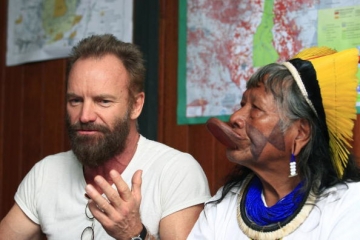Late last year, Sting visited to Brazil (he performed at the pro-environmental Natura About Us Festival in Sao Paulo) to urge the government there to listen to the concerns of indigenous peoples over a proposed new hydro-electric dam in the Amazon.
Sting told a news conference in Sao Paulo on Nov. 22 that the decision to build the Belo Monte dam -- the third largest in the world and a $17.3 billion project which would dam the Xingu River in the heart of the Amazon -- should be made by all Brazilians, especially the native communities that would be most affected. He was reunited with indigenous leader Raoni Metyktire, who joined him in a similar campaign 20 years ago which attracted worldwide attention.

(Photo of Sting and Raoni by Wladimir de Souza/Globo via Getty Images)
Now the government of Brazil has auctioned off the concession for the Belo Monte dam, despite three separate court orders to halt the auction issued in the week prior to the auction's completion. One of these orders arrived in the middle of the auction process itself, but the auction administrators failed to halt the process despite the court order to do so. Indigenous peoples and environmental organizations marked the day of the auction with huge protests throughout Brazil. They highlighted the negative impacts the dam will have on indigenous territories and the natural environment. They also stressed the minimal benefits that the dam will bring to local communities as well as the country as a whole because of he extreme inefficiency of the dam - it would produce at only 30% of its capacity during the four month low water season.
Brazilian officials say the dam is needed to meet the energy demands of its growing economy. But what strikes me as even more sinister than the destruction of rainforests, the displacement of thousands, the impact of fish populations, the contamination of upstream water supplies and more, is the adverse impact this dam will have on global warming.
According to national inventories conducted under the 1990 Climate Convention, all of the large dams in the Brazilian Amazon (Tucuruí, Samuel, Curuá-Una and Balbina) caused much larger emissions than the same amount of energy generated by thermoelectric plants. And, according to studies done in Balbina (Amazonas state, Brazil), and Petit Saut (French Guiana), water deep in reservoirs is under high pressure and contains a high concentration of dissolved methane. When the pressure is suddenly released as the water emerges from the turbines or spillways, a considerable amount of methane escapes into the atmosphere. Each ton of methane emitted has a global warming effect 25 times greater than a ton of carbon dioxide.
The Environmental Impact Assessment, however, only considered the methane emanating from the surface of the reservoir, ignoring several studies on the impacts of the water emitted from the turbines and spillways. This omission in the EIA is especially distorting in Belo Monte's case, because Belo Monte's reservoir is relatively small, while a large volume of water flows through the turbines, especially in the first years. A recent study estimated that the energy generation from the Belo Monte dam and an upstream dam at Babaquara/Altamira would take 41 years to have a positive impact on greenhouse gas emissions.
Hopefully James Cameron's interest in the dam will help sustain media attention to this alarming turn of events. The writer and director of "Avatar" was impressed by the similarity of the story of the indigenous peoples who would be impacted by the dam to the fictional Na'vi characters that he created. With support of grassroots movement "Xingu Vivo Para Sempre" Cameron toured the Xingu River and witnessed the struggles of indigenous communities that would be impacted by the dam. Touched by their stories, the film director decided to go back to Brazil to join in the protests against the dam in Brasilia on April 20th, but this time he decided not go to alone. Cameron convinced two of Avatar's costars, Sigourney Weaver and Joel David Moore to use their celebrity to increase the visibility of the indigenous communities of the Xingu and their struggles against the Belo Monte Dam. I hope the world wakes up to the fact that this is not a Brazilian environmental issue. It could affect the very air we breathe here in America.